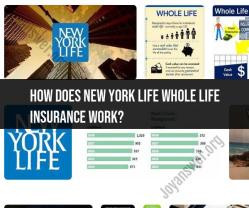Is whole life more expensive than other policies?
Whole life insurance is typically more expensive than other types of life insurance policies, such as term life insurance or universal life insurance. The primary reason for this cost difference is the unique features and components of whole life insurance.
Here's a comparison of whole life insurance with other policies:
Term Life Insurance:
- Term life insurance is the most affordable type of life insurance.
- It provides coverage for a specific term, such as 10, 20, or 30 years.
- Premiums are lower because you are only paying for the death benefit and not accumulating cash value.
- Term insurance is well-suited for individuals who want temporary coverage during a specific period.
Universal Life Insurance:
- Universal life insurance is more flexible than whole life insurance.
- Premiums can be adjusted within certain limits, and the policy may have an investment component.
- Universal life insurance may be more expensive than term insurance but is often more affordable than whole life insurance.
Whole Life Insurance:
- Whole life insurance provides coverage for your entire lifetime.
- It has a savings or cash value component that grows over time.
- Premiums are significantly higher than those of term or universal life insurance because they fund both the death benefit and the cash value component.
- Whole life insurance can be used as an investment vehicle, with the potential for cash value growth and dividend payments.
The cost of a whole life insurance policy can be a barrier for some people, but it offers features that term and universal life insurance policies do not. These features include lifetime coverage, cash value accumulation, and potential dividend payments. Whole life insurance is often used as a long-term financial planning tool and can be appropriate for individuals with specific financial goals and needs.
When considering life insurance, it's essential to evaluate your individual circumstances, financial goals, and budget to determine which type of policy is most suitable for you. It's advisable to consult with a financial advisor or insurance professional to make an informed decision based on your specific needs and objectives.
Is Whole Life Insurance More Expensive Than Other Policies?
Yes, whole life insurance is generally more expensive than other types of life insurance, such as term life insurance. This is because whole life insurance provides lifelong coverage and has a cash value component, which means that a portion of your premiums are invested and grow over time. Term life insurance, on the other hand, only provides coverage for a specific period of time, such as 20 or 30 years.
Comparing Whole Life Insurance Costs to Term and Other Policies
Here is a table comparing the average monthly premiums for a 30-year-old male in good health, according to the Insurance Information Institute:
| Policy Type | Average Monthly Premium |
|---|---|
| Term life insurance (20 years) | $26 |
| Term life insurance (30 years) | $32 |
| Whole life insurance | $451 |
As you can see, whole life insurance is significantly more expensive than term life insurance. However, it is important to note that these are just averages and your individual rates may vary depending on your age, health, and other factors.
Assessing the Long-Term Value of Whole Life Insurance
Whether or not whole life insurance makes financial sense for you depends on your individual needs and financial goals. If you are looking for affordable coverage for a specific period of time, such as to protect your family's finances while your children are young or to pay off a mortgage, then term life insurance is a good option.
If you are looking for lifelong coverage and the ability to build cash value, then whole life insurance may be a good option for you. However, it is important to be aware of the high premiums and the fact that the cash value component may not grow as quickly as other investment options.
When Does Whole Life Insurance Make Financial Sense?
Whole life insurance may make financial sense for you if:
- You need lifelong coverage.
- You want to build cash value that you can access while you are still alive.
- You are willing to pay higher premiums.
- You have a high net worth and are looking for a way to transfer wealth to your heirs tax-efficiently.
Strategies for Affording Whole Life Insurance
If you are considering purchasing whole life insurance, there are a few things you can do to make it more affordable:
- Start young. The younger you are when you purchase a whole life insurance policy, the lower your premiums will be.
- Choose a lower death benefit. The lower your death benefit, the lower your premiums will be.
- Consider a shorter policy term. Whole life insurance policies can be purchased for different terms, such as 20, 30, or 40 years. Choosing a shorter policy term can help lower your premiums.
- Shop around and compare quotes from different insurance companies.
You may also want to consider purchasing a convertible term life insurance policy. This type of policy allows you to convert your term life insurance policy to a whole life insurance policy at a later date, without having to go through a medical exam. This can be a good option if you are not sure if you can afford whole life insurance right now, but you may want it in the future.
It is important to consult with a financial advisor to discuss your individual needs and to get help choosing the right life insurance policy for you.













